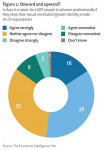For executives, anticipating external changes is even more important when times are tough, says Economist Intelligence Unit
The current economic crisis, which is likely to result in profound changes in nearly every major industry worldwide, is the latest in a series of powerful disruptive forces that have wracked the global economy in the past ten years. The combination of forces such as fluctuating markets for raw materials, frequent financial upheavals, and a growing scarcity of talent are making commercial life increasingly difficult.
An earlier Economist Intelligence Unit report sponsored by PRTM (Fortune favours the brave, December 2007) identified a new breed of high-performing corporation, the “operational innovator”. Such companies, the report said, “seek out new ways of operating, without waiting for pressure from external forces”.
Global disruptors: Steering through the storms looks in more detail at the most powerful of these external forces, all of them global disruptors in one shape or another. Our research shows that companies that get out in front of these forces, taking advantage of opportunities and countering threats, have superior business results.
Key findings of the report include:
· Resource, markets and policy disruptors are forcing companies to change how they do business. Forty-nine percent to respondents considered the growth and decline of markets, economies and competitors across geographies as having a large or very large impact on their business in the next three years. Global shifts in availability of and access to labour and talent, chosen by 44% or respondents, ranked second. The increased complexity of operating in multiple social, political and regulatory environments also ranked high, and was considered by 35% of respondents as a top force in influencing how they do business.
· Change will come in the areas most important to business success. The three areas that executives believe are likely to undergo greatest change in response to global disruptors – organisational structure and talent management; customer operations; and product operations – are the same three areas that contribute most to the performance of their business. In order to thrive under challenging conditions, therefore, firms will must constantly rethink key strategic elements of their business—issues such as what they sell, where they sell it and how they produce it.
· Top performers move early, and they expect to keep on moving. Winning companies are adaptable and are thus able not only to weather storms that arise, but to make any storm, however threatening, work to their advantage. Only 25% of respondents said their companies proactively tracked global forces and tried to act before their competitors did, however. The bulk reacted to disruptive forces, either when they create a need for change (50%) or when the force causes a shortfall in business performance (17%).
Global disruptors: Steering through the storms is available free of charge at:
www.eiu.com/sponsor/PRTM/globaldisruptors
Notes for editors
Global disruptors: Steering through the storms is an Economist Intelligence Unit report, sponsored by PRTM. The research is based on an online survey of 242 senior executives from around the world conducted by the Economist Intelligence Unit in April 2008. Thirty-three percent of the executives’ companies are headquartered in North America, 31% in Europe, and 27% in the Middle East, Africa and the emerging markets of the Asia-Pacific region. An analysis of the geographic spread of the companies’ operations classifies 31% of the respondents’ firms as being “fully global”; another 36% as being moderately global; and 33% as being regional or local. The firms are almost equally divided between products-based and services-based businesses. One-quarter of the respondents’ organisations had annual revenues of more than US$10 billion, while over 60% had a turnover of more than US$500 million. The quantitative survey was supplemented with interviews with CEOs and COOs from Argentina, India, Turkey, the UK and the US.
About the Economist Intelligence Unit
The Economist Intelligence Unit is the world leader in global business intelligence. It is the business–to–business arm of The Economist Group, which publishes The Economist newspaper. As the world's leading provider of country intelligence, the Economist Intelligence Unit helps executives make better business decisions by providing timely, reliable and impartial analysis on worldwide market trends and business strategies. More information about the Economist Intelligence Unit can be found at www.eiu.com.
About PRTM
Since 1976, PRTM has created a competitive advantage for its clients by changing the way companies operate. PRTM management consultants work with senior executives to develop and implement innovative operational strategies that deliver breakthrough results. The firm is a leader in operational strategy, supply chain, product development, and customer value management. PRTM has 18 offices worldwide and serves major industry and global public sectors.
웹사이트: http://www.eiu.com
연락처
Joanne McKenna
Press Liaison
Economist Intelligence Unit
26 Red Lion Square
London
WC1R 4HQ
UK
Direct: +44 (0) 20 7576 8188
Sales: +44 (0) 20 7576 8181
Switchboard: +44 (0) 20 7576 8000
email: 이메일 보내기
이 보도자료는 Economist Intelligence Unit가(이) 작성해 뉴스와이어 서비스를 통해 배포한 뉴스입니다. 뉴스와이어는 편집 가이드라인을 준수합니다.




